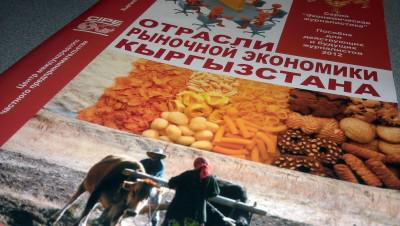
Informed and educated citizens are an important part of a thriving democracy. When citizens are well-informed and equipped with facts and independent analysis, they can better engage in the policymaking process at every level to keep the government honest, responsible, and accountable to its constituents.
Kyrgyzstan has a relatively free media compared to other Central Asian countries. However, good information on business and economic issues is scarce in Kyrgyzstan. Typically, available materials are written in professional jargon and not easily understood by average citizens or by journalists. Journalists lack the knowledge of basic market concepts and the benefits of market-oriented economic reforms.
CIPE’s partner, the Kyrgyz Stock Exchange Press Club (KSEPC) engaged and educated journalists from different regions to improve economic and business reporting in Kyrgyzstan. To help journalists better understand crucial market-related issues, KSEPC published a 76-page practical manual (in Russian and Kyrgyz) for economic journalists concentrating on basic information regarding key economic sectors.
The manual consists of nine chapters:
- The State and Its Role in Regulation of the National Economy written by Andrey Dogadin
- The Construction in Kyrgyzstan: Reforms and Problems, written by an expert at Foresight Foundation, Yulia Shapovalova.
- The Structure of the Transportation Sector of the National Economy: Concepts, Nature and Types, written by Andrey Dogadin.
- Foreign Trade and External Factors, written by the Director of Financial Company “Senti,” Nelly Simonova.
- Agriculture in the Kyrgyz Republic written by a representative of Financial Company “Senti,” Adilbek Shumkar.
- The Food Processing Industry of Kyrgyz Republic written by Nelly Simonova.
- Tourism: Without Love and Public Relations ,written by a representative of KSEPC, Larisa Lee.
- Review of the Textile Industry of the Kyrgyz Republic, written by the Deputy Director of Legprom Association, Farkhad Raimjanov.
- Information and Communication Technologies, written by the Director of the Public Foundation Civil Initiative on Internet Policy, Tammu Mambetalieva.
Each chapter contains theory and background, as well as extensive practical information with specific real-life examples, and a glossary of key terms. This glossary is especially important in the Kyrgyz-language version, as journalists writing in Kyrgyz often have difficulty selecting the right words and phrases to clearly describe economic developments. The handbook also contains questions for discussion to facilitate its use in educational settings.
KSEPC officially released the Russian-language version of the handbook on March 18, 2012. On May 14, 2012, KSEPC completed its translation of the manual into Kyrgyz, and sent 760 physical copies (380 in Kyrgyz and 380 in Russian) to recipients in Bishkek, Talas, Jalalabad, Osh, Issyk-Kul, Naryn, Batken, and Chui Oblasts. The recipients were local and regional mass media agencies, universities, partners and participants of Economic Journalism Saturday Schools.
The CIPE/NED –funded educational program for practicing journalists has gained in prestige over the last three years. The educational program provides a unique informational platform for journalists on basic market economics and other key topics.

